Hwyl fawrpublished at 14:18 GMT 25 March
Eluned Morgan’s twenty-third session as first minister comes to a close.
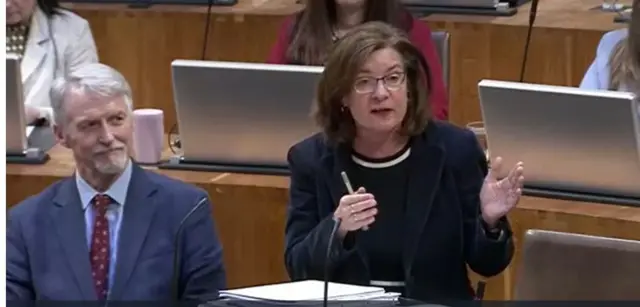 Image source, Senedd Cymru
Image source, Senedd CymruEluned Morgan
Eluned Morgan is quizzed by opposition party leaders and other MSs during First Minister's Questions
By Alun Jones
Eluned Morgan’s twenty-third session as first minister comes to a close.
 Image source, Senedd Cymru
Image source, Senedd CymruEluned Morgan
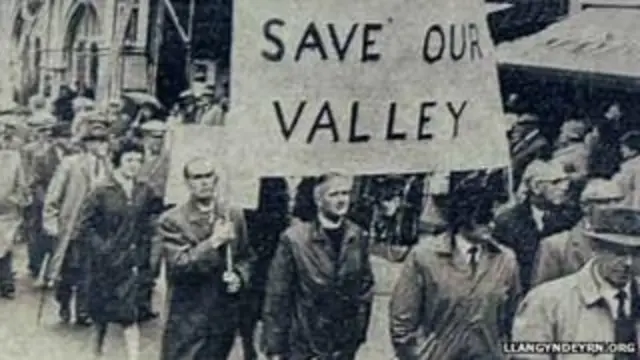
A three-year battle took place to save Llangyndeyrn from being flooded
Plaid Cymru MS Adam Price asks "what discussions has the first minister had about the issuing of warrants for access onto land in the Tywi valley by GreenGen Cymru?"
Eluned Morgan replies she has had no such discussions with GreenGen Cymru.
Adam Price says "I've been informed that there have been a number of applications, in the last week or so, for the issuing of warrants, to allow GreenGen Cymru to have access to land without permission".
He warns, "this will certainly exacerbate community tensions in the Tywi valley, which are already riding very high. We're facing the prospect of mass civil disobedience the likes of which we haven't seen in Carmarthenshire since the early 1960s, of course, when the people of Llangyndeyrn blocked the path of surveyors wishing to build a reservoir."
Eluned Morgan replies, "I recognise that there are tensions in the community; I recognise that there are many people who object to this. The Electricity Act 1989, however, is very clear that 'a person authorised in writing by a licence holder may, at any reasonable time, enter upon and survey any land for the purpose of ascertaining whether the land would be suitable for use for any purpose connected with the carrying on of the activities which the licence holder is authorised by his licence to carry on.' So, they have a legal right to do this. Now, just because they've got a legal right doesn't mean that they shouldn't be sensible and sensitive and reach out and try and work with the communities. I think it's in everybody's interests to try and decrease the tensions in relation to this. But I also think that it's probably worth recognising that we're going to see three times as much demand when it comes to electricity in Wales by 2050, and we are going to need new infrastructure."
GreenGen Cymru, a subsidiary of Windward Energy, has been given compulsory land access powers by energy regulator Ofgem, and is proposing the installation of a new 132kV overhead line to connect Lan Fawr Energy Park near Lampeter with the National Grid's new substation in Carmarthen. The project includes controversial plans for over 200 27m high pylons to carry the cables more than 50km across the countryside.
Residents of Llangyndeyrn in Cwm Gwendraeth fought off plans to turn their village into a reservoir. Residents found out about Swansea Water Corporation's plans in a newspaper article on 16 March 1960. A three-year legal battle - and a week-long stand-off - ensued, which eventually proved successful.
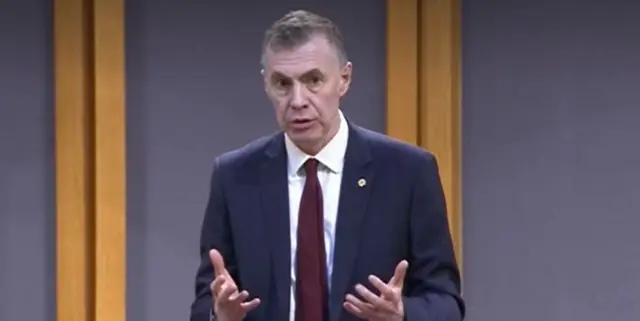 Image source, Senedd Cymru
Image source, Senedd CymruAdam Price
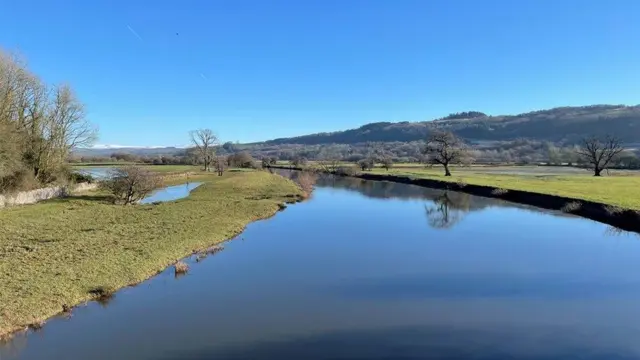
Afon Tywi is designated as a Special Area of Conservation
Conservative Janet Finch-Saunders raises concerns about the digitisation of patient health records in Betsi Cadwaladr University Health Board.
She says that in 2020 Cardiff and Vale University Health Board was funded to lead a £4.8 million five-year programme for eyecare. This included the deployment of an electronic patient record for ophthalmology services, working alongside other health boards.
But she says as of June 2023 five health boards in Wales had not yet implemented the system.
She calls for "a detailed review of the progress of this programme... to ensure that Open Eyes has been implemented in every health board in Wales".
The first minister acknowledges "this has been a situation that's been ongoing for a long period of time and I can assure you that the Welsh government is keeping a close eye on this particular situation. There were some issues around Open Eyes and the ability to roll it out across the country. I know that the cabinet cecretary is fully aware of the challenges around this, but we do need to move quicker and further when it comes to digital eye care programmes, but we have to make sure it's with the appropriate programme and project that goes alongside it. But there were some issues, I know, with the Open Eyes project."
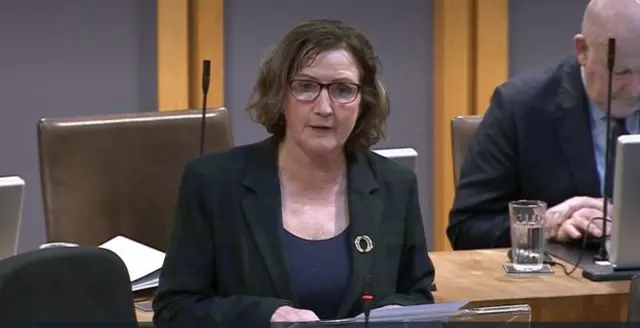 Image source, Senedd Cymru
Image source, Senedd CymruJanet Finch-Saunders
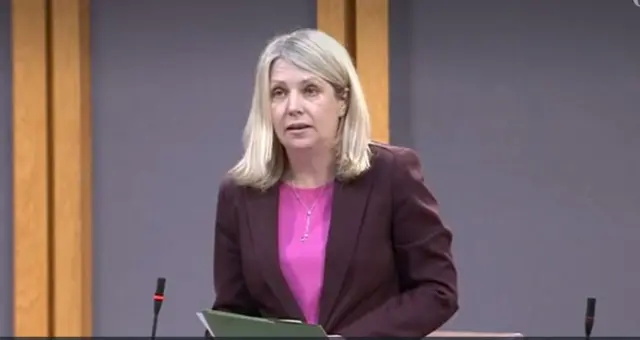 Image source, Senedd Cymru
Image source, Senedd CymruHannah Blythyn
Labour's Hannah Blythyn raises concerns about access to high-street banking services in town centres across her Delyn constituency.
She says, "just last week, residents and businesses in Holywell and the surrounding area heard the disappointing news that Santander is now proposing to close its branch in the town. This is the latest in a long line of departures which will leave the people of Holywell without a single bank branch. I'm sure you'll agree my constituency community deserve better than this, and there is rightly an active campaign to try and save the bank."
She adds there is a "clear case for a banking hub in the heart of Holywell".
The first minister replies "the loss of many bank branches has become a major cause of concern".
She also says that this month the Welsh government is convening a second banking in Welsh communities event, "drawing together stakeholders from across the financial sector alongside those with an active interest in banking service provision in our communities".
A raft of High Street bank branches have been closed in recent years, as more people have shifted to accessing banking services online.
Recent figures revealed that cash use in shops rose for a second year in a row in 2023 after a decade of falls, according to retailers.
Notes and coins were used in a fifth of transactions, the British Retail Consortium said, as shoppers found cash helped them to budget better.
 Image source, Getty Images
Image source, Getty ImagesPlaid Cymru leader Rhun ap Iorwerth refers to the policy he announced at his party's spring conference in Llandudno that he would introduce a payment scheme to tackle the "national stain" of child poverty.
BBC Wales understands the party is looking at a £10m pilot scheme, which would see £10 a week for 15,000 children between zero and six whose parents already receive universal credit.
It would be along the lines of a scheme run in Scotland, which was initially piloted at £10 a week and is now £26.70 a week.
The Cynnal payment - Cymraeg for maintain - is part of Plaid Cymru's pitch for the next Senedd election in May 2026.
Rhun ap Iorwerth says, "we haven’t got the powers to introduce a direct child payment in the same way as they’ve been able to do in Scotland, where they have more powers, but we have identified a way of doing this. The Treasury could help, though, by not putting barriers in our way. Will the first minister agree to make the case to the Treasury to help us or, at least, not to hinder us in trying to deliver what could be a transformational anti-poverty measure in government from next year?"
The first minister replies "we’ve spent over £5 billion, when it comes to poverty alleviation in this country, over the past few years. And I’m really pleased that we were able to work together to introduce free school meals."
She adds, "I did note that your suggestion came in without any suggestion of where that money would come from. That’s what responsible government looks like."
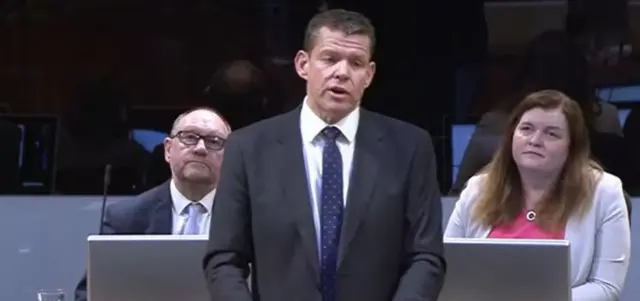 Image source, Senedd Cymru
Image source, Senedd CymruRhun ap Iorwerth
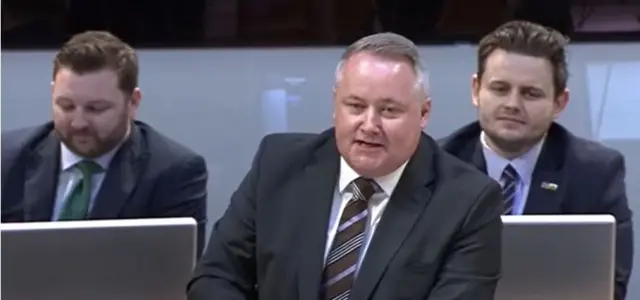 Image source, Senedd Cymru
Image source, Senedd CymruDarren Millar
Darren Millar, leader of the Welsh Conservatives in the Senedd, raises the issue of council tax increases in Wales, which vary across different local authorities.
He says "many taxpayers are galled, frankly, by the big increases in their bills, while they see local services cut. Facilities such as libraries, public toilets, leisure facilities and community centres are being closed. Why is it that people in Wales are paying more in council tax but getting less?"
The first minister replies "I can't believe the Tories are talking to us about high levels of taxation. Your government left us with a legacy of some of the highest taxation rates we've seen in this country for years, for decades."
She adds that Wales' 22 local authorities were given a cash boost of over £250m by Welsh ministers in the budget.
Darren Millar also says that "one of the reasons why council tax increases have been depressed and have been lower in England is because local people have a greater say in council tax, because when excessive increases are proposed they have to go to the public, councils, to put it to a vote in a local referendum. Why is it that you are denying that opportunity to council tax payers here in Wales?"
Eluned Morgan replies "I’m not sure if the public in Wales are going to be grateful for even more elections".
Bridgend will see the lowest increase at 4.5%, while residents in Pembrokeshire face will see the highest hike of 9.35%.
Council tax Increases by local authority
Blaenau Gwent – council tax will rise by 4.95%, equating to an extra £1.22 per week for a Band A property and £1.42 for Band B homes. Despite the increase, this remains one of the lowest rates in Wales.
Bridgend – the lowest rise in Wales at 4.5%, equating to an extra £1.59 per week for a Band D property.
Caerphilly – a 7.9% rise will see Band D council tax increase from £1,446.37 to £1,560.63, an extra £2.20 per week.
Cardiff – the capital’s council tax will rise by 4.95%
Carmarthenshire – the rise is 8.9%
Ceredigion – will raise council tax by 9.3%
Conwy – an increase of 8.95%
Denbighshire – a 6% increase
Flintshire – a 9.5% rise means Band D properties will pay an extra £157 per year.
Gwynedd – an increase of 8.99%
Ynys Môn - the rise is 8.5%
Merthyr Tydfil – council tax will rise by 5.5%, bringing the Band D charge to £2,083.21 for 2025-26 - an annual increase of £108.60
Monmouthshire – a 7.8% rise
Neath Port Talbot – a 7% increase
Newport – council tax will rise by 6.7%
Pembrokeshire – a 9.35% rise equates to £2.71 extra per week for Band D properties
Powys – an 8.9% increase
Rhondda Cynon Taf – a 4.7% increase
Swansea – a 5.95% rise will take a Band D bill from £1,641.95 to £1,739.61
Torfaen – a 4.95% rise will bring Band D council tax to £1,627.32, an annual increase of £76.75
Vale of Glamorgan – a 5.9% rise
Wrexham – a 9.5% increase
 Image source, Getty Images
Image source, Getty ImagesPlaid Cymru MS Cefin Campbell raises the issue of "unacceptable" NHS waiting lists in mid and west Wales.
He says that e-mails he receives from constituents "contradict the story published by your government last week, stating that the monitoring level for Hywel Dda University Health Board will be downgraded from level 4 to level 3".
He elaborates, "despite the announcement, there was a report hours later that the provision for non-urgent mental health cases in north Ceredigion would be coming to an end. Only 56 per cent of the 147 mental health cases in north Ceredigion have care and treatment plans in place which falls a long way short of the target of 90 per cent that you yourself have set. That's just a microcosm, first minister, of the grave situation in terms of unacceptable waiting lists in my region."
Eluned Morgan says the fact that Hywel Dda University Health Board has been de-escalated from level four to level three of intervention should be welcomed.
She adds, "I know that there is a unique problem in the Ceredigion area at present, and I am aware of that. Now, the point at present is that there are many vacancies available - they've gone out and they've failed to appoint to the substantive consultant psychiatrist post. So, what they've done is brought a specialist nurse in, over the short term."
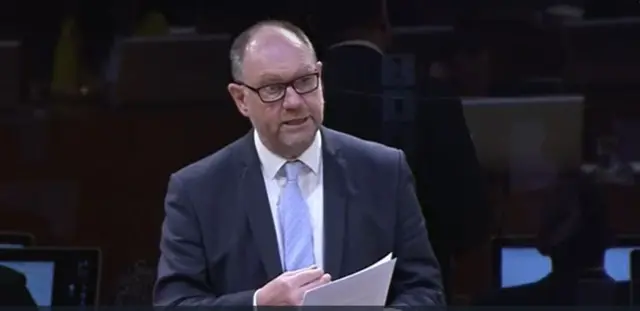 Image source, Senedd Cymru
Image source, Senedd CymruCefin Campbell
Llywydd Elin Jones conducts a ballot to determine the names of members who may table questions to the first minister.
Conservative Paul Davies says improvements are "desperately needed" to support people waiting for diagnosis of rheumatoid arthritis - a long-term condition that causes pain, swelling and stiffness in the joints - in Pembrokeshire.
He says "a constituent of mine has been informed that the waiting time for an urgent appointment with the rheumatology department at Withybush hospital is 13 months, and 15 months for a non-urgent appointment... it’s not acceptable that people in Pembrokeshire are waiting so much longer than their relatives in other parts of the UK for the same treatment. These people are waiting in pain, and they are understandably angry."
First Minister Eluned Morgan replies "it’s true that our waiting lists were way too high. I’m really pleased to say that they are coming down, and they’ve come down for the second month in a row. And, certainly, in Hywel Dda, they are on course to eliminate the 104-week-long wait. So, that’s two-year waiting lists. So, they’re going to get rid of those by the end of March this year."
The waiting list for hospital treatment in Wales has fallen slightly for the second month in a row.
But the Welsh government's target to reduce the numbers waiting longer than two years – in most specialties – has still not been met.
In January, 613,000 patients were waiting for 796,802 treatments to take place, down from 800,395 treatments in December.
The total number waiting longer than two years is just under 21,100.
The target to eliminate waits this long applies in certain specialities, but even within these areas there are 2,713 people waiting more than two years.
These specialities include Accident and Emergency, Cardiology, Radiology and Midwifery.
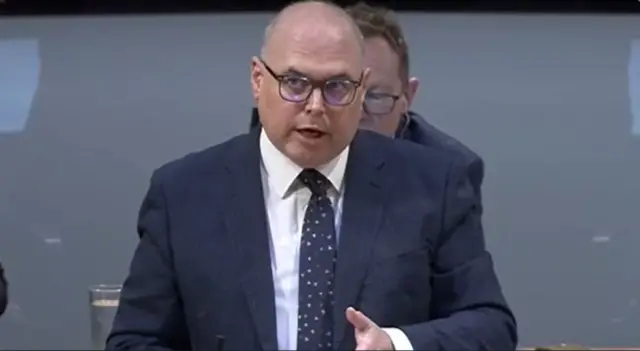 Image source, Senedd Cymru
Image source, Senedd CymruPaul Davies
Hello and welcome to our live coverage of Eluned Morgan’s twenty-third session of First Minister's Questions.
The meeting is held in a hybrid format, with some members in the Siambr (Senedd chamber) and others joining by video-conference.
You can click on the play button above to watch the proceedings from 1.30pm.
